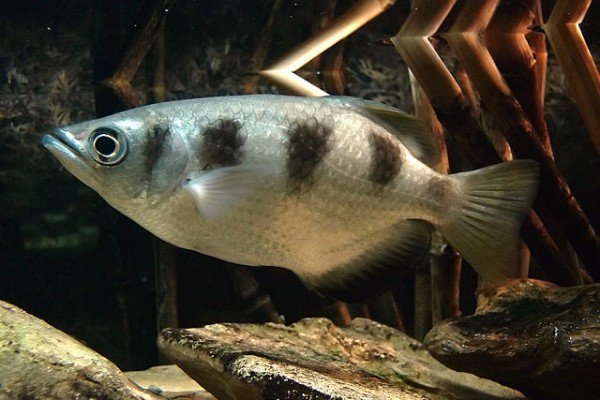- Home
- >
- The ability of archerfish to accurately recognize human faces suggests a fallacy in the theory of evolution
A recent biological study has found that a species of tropical fish possesses a remarkable ability to distinguish human faces. This experiment has shed light on the complexity of fish capabilities, challenging previous assumptions and suggesting that the theory of evolution may be incorrect.
-

射水魚的人臉識別能力令人驚訝。(維基百科)
According to a report by the technology website Gizmag on June 7th, scientists from the University of Oxford in the UK and the University of Queensland in Australia collaborated to observe the facial recognition abilities of archerfish, a type of tropical fish known for spitting water to catch insects.
The researchers trained the fish to shoot water at a specific human face displayed on a monitor above their fish tank. They then presented 44 different faces, and the results showed that the archerfish were able to selectively target the face initially presented to them, displaying an astonishing level of accuracy in recognizing human faces.
Dr. Cait Newport, the lead researcher from the University of Oxford, said, "In all cases, the fish continued to shoot water at the face they were trained to recognize, proving that they have the ability to distinguish between two different faces." According to Dr. Newport, the fish's ability to recognize faces surpasses expectations, even considering that the faces were black and white and of standardized appearance. She mentioned, "Even we as humans might find it challenging, as the faces were in black and white, and they were all standard face shapes. But the fish were able to recognize the trained face."
The research included observing the performance of four archerfish, and the surprising finding was that all four fish displayed remarkable abilities in recognizing human faces. In the first experiment, the accuracy of face recognition by the fish reached a maximum of 81%, while in the second experiment, where the faces had less distinguishable differences in color, brightness, and head shape, the recognition accuracy reached a maximum of 86%. Dr. Newport stated that it's possible that other fish species may possess similar astounding abilities.
Dr. Newport mentioned, "Fish brains are way simpler than human brains and lack the cortical tissue that humans use for facial recognition. It has been assumed that without this cortical tissue, fish are unable to recognize faces and their intelligence is limited. However, more and more research demonstrates that fish possess capabilities far beyond what was previously thought."
According to Gizmag, for the general public, recognizing faces may not seem like a challenging task. However, researchers explain that the process of distinguishing between faces is a remarkably complex one. Previous evidence from research suggested that the human brain has a specialized cortical region, defined by evolutionary theorists, that specifically handles the recognition of different faces. So far, this ability has been observed in dogs, horses, sheep, cattle, and birds, as they possess a similar so-called neocortex, resembling that of humans.
It is worth noting that according to the theory of evolution, fish brains lack this neocortex, and fish are considered to be less advanced than dogs, horses, and other animals. However, this study demonstrates that fish, like dogs and horses, possess the ability to recognize faces, suggesting that animals may not necessarily require this so-called neocortical region in the brain to perform complex facial recognition functions.
Source: Epoch Times (Hong Kong) - Translated from Chinese
